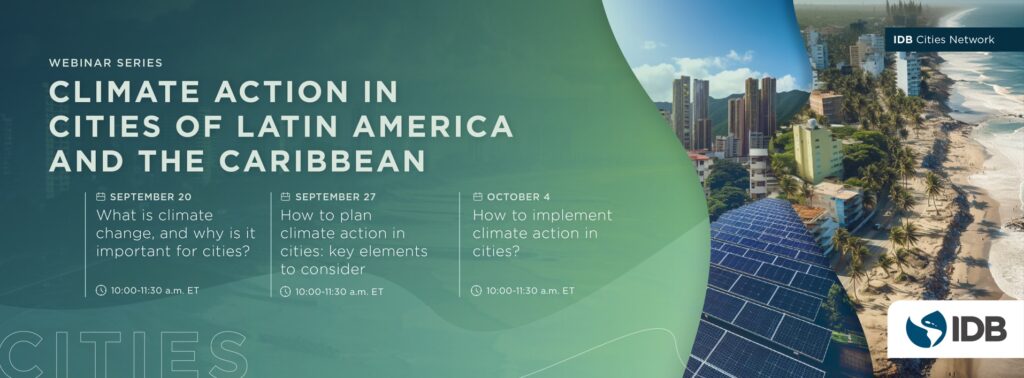Este artículo está también disponible en / This post is also available in: Spanish
Latin America and the Caribbean (LAC) must get ready to face the serious consequences of climate change. With 81% of its population residing in urban areas, cities are at the forefront line to play a leading role in climate action. Why is this so important? Around 70% of the region’s greenhouse gas (GHG) emissions are generated in urban areas and almost 80% of disaster losses in LAC occur in urban areas. So how can cities in our region take the right steps to lead the way in reducing emissions and building climate resilience?
At the Inter-American Development Bank (IDB), we work to improve lives in LAC. This includes helping our subnational governments to achieve sustainable development, in line with the goals of the 2030 Agenda and the Paris Agreement. City governments have the opportunity to design measures and actions for climate change mitigation and adaptation based on the particular characteristics of their territories and population. It would be ideal that the sum of efforts between municipalities and actors of society contribute to the achievement of national and global climate goals.
The IDB Cities Network, with the objective of strengthening the capacity of municipalities to address climate change and promote sustainable and resilient growth, has created a series of three webinars that seek to contribute to the Sustainable Development Goals (SDGs) and promote climate action in cities, integrating the perspective of climate change into the urban, economic and social agenda of the region. These webinars, available in English, Spanish and Portuguese, are especially recommended for government officials, both national (Ministries of Planning and Local Development, and Natural Resources) and regional/municipal government officials in LAC, as well as local NGOs and implementing agencies. Don’t miss these webinars, and be part of the conversation to build a sustainable future for all!

What is climate change and why is it important for cities?
The first webinar delved into understanding climate change and its relevance for LAC cities. Urban areas in our region are major emitters of greenhouse gases and, in turn, are impacted by climate change.
What role should cities play in this scenario? The role should be that of an agent of change. Decision-making at the local level is agile, with knowledge of the urban context, and allows global challenges to be addressed in a timely manner.
This webinar explored the importance of climate action in cities of all sizes. In particular, a special emphasis will be placed on the need to reduce emissions and strengthen resilience to climate change. It will also explore the importance of a strong regulatory framework that promotes multi-level coordination and includes climate management tools and practical guidelines to steer cities towards carbon neutrality and a more resilient and sustainable future. In addition, the webinar will examine the effects of climate change in Recife and Mexico City and how these cities are addressing these challenges.
The meeting focused on the importance of action in municipalities of all sizes, with emphasis on the need to reduce emissions and strengthen resilience to climate change. It also addressed the desirability of a strong regulatory framework that includes climate management instruments and practical guidelines to move cities towards carbon neutrality and a more sustainable future. The relevance of multilevel coordination and the challenges and opportunities of various LAC cities in the face of climate change were also shared.
How to plan climate action in cities? Key elements to consider
The development of Climate Action Plans (CAPs) in cities is a fundamental process for addressing climate change. Key elements of city climate action planning range from developing clear diagnostics and setting emissions targets, to addressing resilience to climate risks. This encompasses elements of inclusiveness, social, environmental and economic benefits, as well as the establishment of a clear governance and collaboration structure for the achievement of set targets. To achieve this, action planning needs to be based on the best available science.
What does this mean? It means that cities must have a detailed knowledge and understanding of the greenhouse gas (GHG) emissions in their city. This is achieved through accurate inventories that provide data to set emission reduction targets and assess progress over time.
The second webinar focused on climate action planning in cities. Through the presentation of case studies from ICLEI – Gobiernos Locales por la Sustentabilidad, the Red Argentina de Municipios frente al Cambio Climático (RAMCC), the city of Bucaramanga in Colombia, and Joao Pessoa in Brazil, we explored the challenges and opportunities cities face in incorporating climate action in their urban planning. We discussed the importance of clear science-based planning to create an effective CAP in cities and combat climate change. We will also analyze the fundamental role of greenhouse gas inventories in guiding emission reduction and adaptation strategies.
How do we implement climate action in cities?
Webinar 3: Wednesday, October 4
The third webinar addressed relevant aspects for the implementation of key projects related to cities’ climate action plans. Despite the efforts of cities in developing climate action plans, they often face a crucial hurdle, which is to turn ideas into solid and bankable projects. Many low-carbon, climate-resilient infrastructure proposals never make it to the investment stage. In this session, through C40’s experience with the Urban Shift and Cities Gap Fund programs, as well as the IDB Cities Lab implementing pilot climate change adaptation projects in the cities of San Salvador and Santo Domingo, we explored how various organizations are providing the technical resources needed for cities to develop projects attractive to investors. We also highlighted the importance of seeking new sources of funding and collaboration to drive innovative local solutions.
Join the conversation
At the IDB Cities Network we believe that through the exchange of experiences, cities in the region can make progress on key issues to address the challenges of climate change. These webinars are an excellent opportunity to strengthen knowledge on climate action in cities based on real cases where they have been successfully implemented. With multi-stakeholder collaboration and access to subnational climate finance, together we can pave the way towards a more sustainable urban future, meet the Sustainable Development Goals (SDGs) and the Paris Agreement, and mainstream the climate change perspective in our cities.
Join us in this mission to build a greener and more resilient future for generations to come!


Leave a Reply